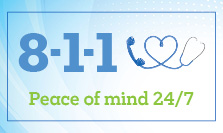Pregnancy and Postpartum (Perinatal) Mood Disorders
Pregnancy and life with a new baby may not always be what you expect. Pregnancy, the birth of a baby, or an adoption brings physical, emotional, and social changes. Adjustments to new roles and relationships are not always easy. It can be a time of emotional change and transition for new parents, their partners, and their families.
Perinatal mood disorders are real
Up to 80 percent of new parents will experience postpartum blues or "baby blues" within the first few days or weeks after their baby is born. This is normal. It will pass in a few days or at the most two weeks. It’s important to remember to take care of yourself and let family and friends help you as well.
Sometimes the blues don’t go away; or, you may also feel this way during your pregnancy or later on during the baby’s first year.
As many as one in five mothers may have a perinatal mood disorder such as depression and/or anxiety. A perinatal mood disorder may occur anytime during the pregnancy or in the year after the baby is born.
Perinatal mood disorders are different from the "baby blues" that many parents may experience in the first few days after a baby’s birth.
- Have you been bothered by feelings of sadness, hopelessness, or anxiety in the past two weeks?
- Have you been bothered by having little interest or pleasure in things you used to enjoy?
- Have these feelings interfered with your daily functioning, relationships, or connection to your baby?
If you've had any of these symptoms for more than two weeks, don't wait. There is help for you and your family:
- See your health care provider (family physician, nurse practitioner, OB/GYN);
- Contact your local Public Health Nursing office;
- Call Sexual Health, Options & Reproductive Services at 1-844-365-8258. (Please note, due to a temporary staffing shortage not all calls may be answered immediately.);
- Call PEI’s 811 Telehealth line by dialling 8-1-1 or 7-1-1 (TTY) if you are hearing impaired;
- Call the Mental Health and Addictions Phone Line at 1-833-553-6983 (toll-free)
- Visit a Mental Health and Addictions Open Access Counselling location to speak with a mental health or addictions counsellor; or
- Contact Community Mental Health.
There are a number of online resources available that can help you learn more about depression and anxiety, how you may be feeling, and what you and your family may be able to do to help. View the Online Resources-Self Help for Anxiety and/or Depression During Pregnancy or After the Birth of Your Baby.
For more information see the Postpartum Mood Disorders brochure.
What can your Public Health Nurse do to help?
If you are pregnant, and you are worried about anxiety or depression, your Public Health Nurse can assist you with completing a screen for perinatal depression and anxiety using the Edinburgh Postnatal Depression Scale screening tool [PDF | 149 KB]. Your Public Health Nurse can also provide you with information about support/help that is available in your community.
In addition to your Public Health Nurse, the Women’s Wellness Program & Sexual Health Services or your health care provider can provide further information about depression and anxiety and the support/help that is available in your community.
Public Health Nurses offer information about Postpartum Mood Disorders and services of Public Health Nursing and the Women’s Wellness Program & Sexual Health Services when doing follow-up with families after the birth of their baby.
New parents are invited to participate in screening for perinatal depression and anxiety using the Edinburgh Postnatal Depression Scale screening tool at their child’s two-month health clinic visit. If you are concerned about how you are feeling, your Public Health Nurse can assist you to complete the Edinburgh Postnatal Depression Scale screening tool before your child’s appointment. Contact your local Public Health Nursing office and ask to speak to a nurse.
Your Public Health Nurse can provide support and assist you to get the help best suited for your needs.

